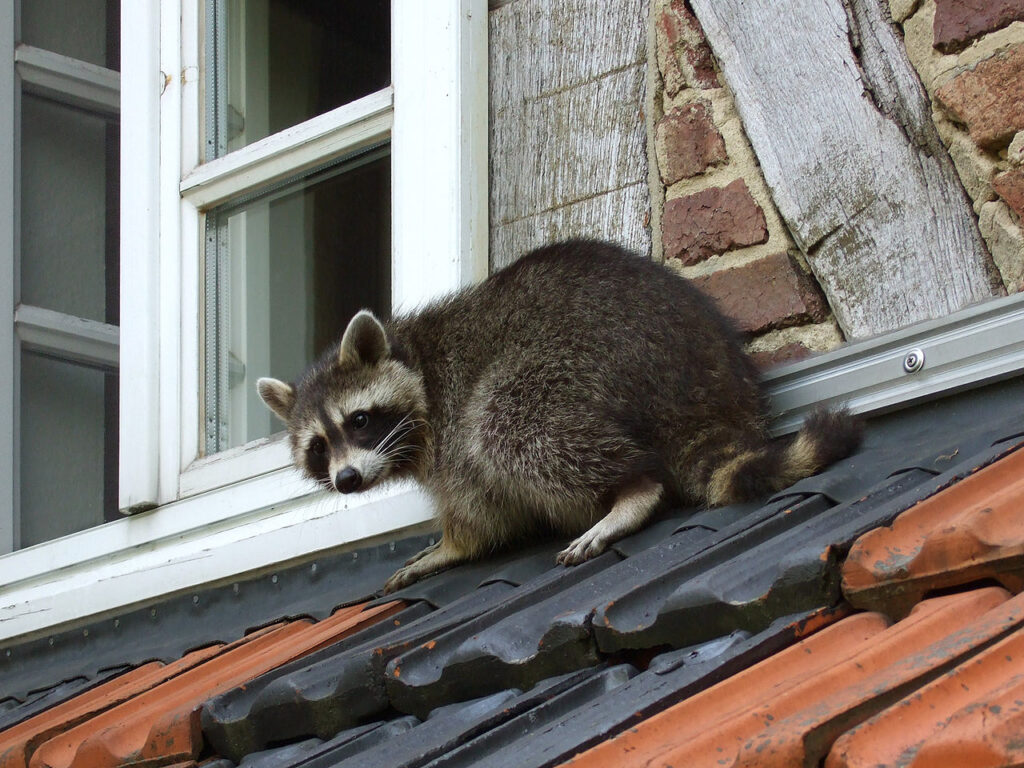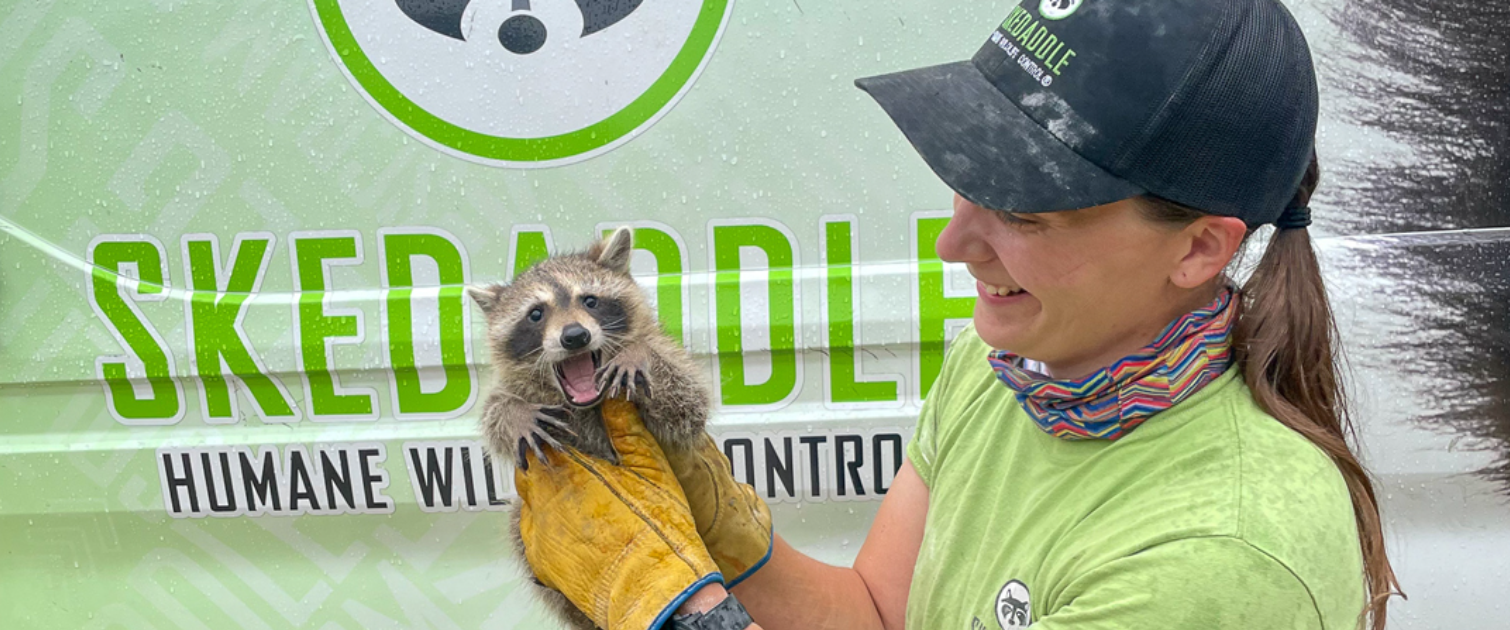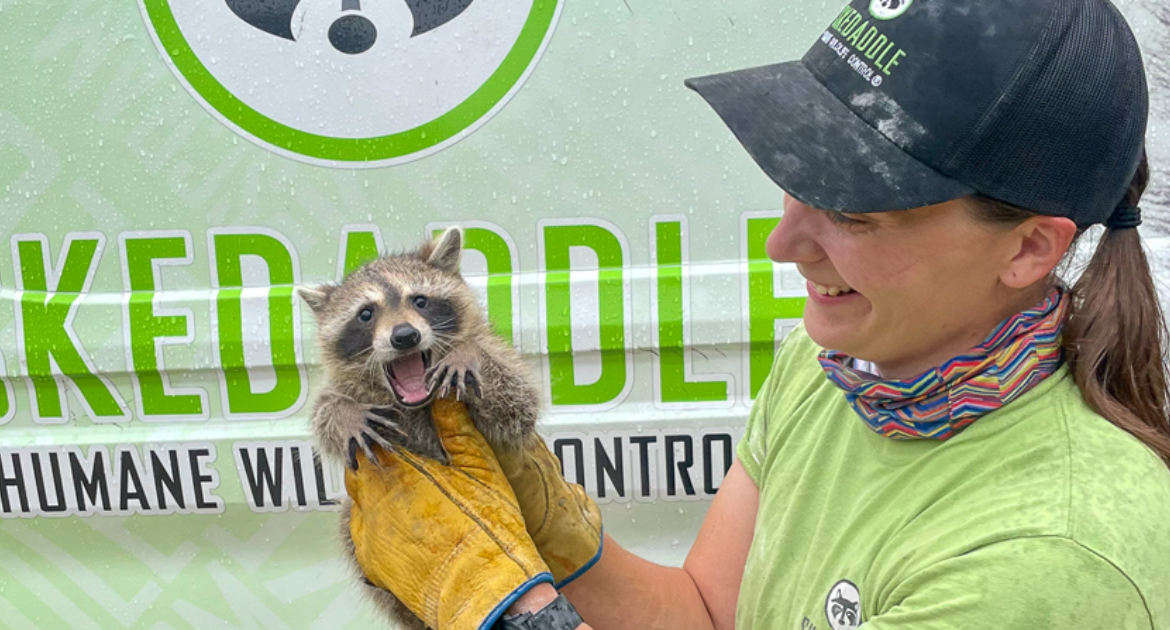When it comes to Pickering wildlife control, raccoons are often at the forefront of people’s concerns. They may be cute and seem harmless, but are raccoons dangerous? Should you be worried about a potential raccoon attack? The short answer is, it’s possible.
While raccoons generally want to avoid confrontation with humans, they can become aggressive if they feel threatened or cornered. It’s important to remember that they are wild animals and should be treated as such. So, if you encounter one while out and about in Pickering, it’s best to keep your distance and avoid any interactions. If they feel threatened, they can bite and scratch. And, if they become infected with rabies, a viral disease that affects the brain and nervous system, the stakes get higher.
In this article, our Skedaddle experts go over everything you need to know about raccoons, including what to do if a raccoon attacks you and when to call us for raccoon removal in Pickering.
Are Raccoons Dangerous?
The danger that raccoons pose to humans largely depends on their health status and circumstances. While these animals can carry diseases like rabies, roundworm, and leptospirosis, these are not common in urban populations so it is quite rare for someone to contract one from an encounter.
However, raccoons can and will defend themselves fiercely if they feel threatened. A cornered animal can resort to biting and scratching, potentially leading to subsequent infection. More common than health risks associated with diseases are these physical injuries that can occur if a raccoon is provoked.
Also, it’s worth noting that they can become quite a nuisance when it comes to property damage due to their never-ending search for food and shelter. If a raccoon decides that your attic or garage is the perfect place for a den, they can cause substantial destruction.
Physical Characteristics That Enhance Their Defence Mechanisms
When understanding the dangers associated with raccoons, it’s important to also consider their physical features. Raccoons are strong and agile animals with sharp claws and strong jaw muscles. They have a “masked” face, which contributes to their nocturnal lifestyle. Their agile climbing abilities make an escape from or engagement with a potential threat fairly uncomplicated. These physical characteristics enhance their defence mechanisms, making them quite formidable when they feel threatened.
Raccoon Behaviour
The behaviour of a raccoon can also signal their level of danger to humans. Raccoons active during daylight hours may be exhibiting signs of illness such as rabies. Rabid animals might appear lethargic, disoriented, or aggressive. However, seeing a raccoon during the day doesn’t automatically mean it’s rabid. It could be out foraging for extra food, especially if it is a nursing mother. In any case, if you see one displaying unusual behaviour, it’s best to contact a wildlife control expert at once.
Prevention Strategies: Keeping Them at Bay
To naturally deter raccoons from your property, there are several strategies you can employ. These tactics don’t harm them in any way but simply discourage them from seeing your property as a food source or convenient den.
Securing Your Garbage Bins
Raccoons are known opportunists and can rifle through your garbage bins in their continual quest for food, often leaving a mess in their wake. Invest in sturdy bins with locking lids or a secure storage area that they can’t access. Additionally, refrain from keeping food waste outside until pick-up day to prevent any tempting scents from luring them to your property.
Removing Potential Food Sources
Be mindful of other potential food sources on your property, as open sources of food will undoubtedly attract these resourceful animals. Eliminate potential attractants by not leaving pet food outside, picking fruit and vegetables in your garden promptly, and properly maintaining compost facilities with the appropriate covers and enclosures.
Sealing Entry Points
Raccoons have a knack for finding comfy spots for dens, which unfortunately can often be inside attics, garages, or under decks or porches. Perform regular checks and maintenance of your home to seal off potential entries such as open vents or loose shingles. Using durable materials like heavy gauge wire mesh can prevent raccoons from creating an unwelcome residence.
Employing Natural Deterrents
Some natural deterrents can help make your property less appealing. Planting deterrent plants like mint, and installing motion detector lights, or sprinklers can sometimes dissuade them from spending too much time around your home.

What to do if a Raccoon Attacks You
If you unfortunately find yourself in a situation where a raccoon attacks you, it’s crucial to take immediate action to ensure safety and prevent any severe consequences.
- Protect Yourself
Try to put a barrier between yourself and the animal. Use a jacket, a bag, or anything else at your disposal to fend off its advances. The aim should be to discourage the animal rather than injure it.
- Seek Safety
As soon as you are able, retreat to safety. This may be your home, your car, or any other nearby shelter. Raccoons are less likely to follow you into enclosed spaces.
- Do Not Attempt to Handle the Animal
Refrain from attempting to pick up or handle the attacking animal. This can provoke it further and put you at greater risk of injury or infection. Instead, give the animal plenty of space to retreat.
- Seek Medical Attention
If the raccoon has bitten or scratched you, get medical attention immediately. Even minor wounds can lead to serious infections, notably from bacteria present in the animal’s mouth. Moreover, the risk of transmission of diseases such as rabies, although rare, is a serious concern.
- Contact a Wildlife Control Expert
Finally, it’s crucial to report any raccoon attacks to local animal control or wildlife services. This allows them to monitor activity and intervene if necessary, to prevent future incidents. At Skedaddle, our trained professionals can safely and humanely handle wildlife conflicts, ensuring the safety of both the public and the animals.
Remember, the best way to avoid an attack is by prevention. Securing your property, eliminating food sources, and maintaining a respectful distance from wildlife are all effective ways to keep both you and the local raccoon population safe. But if you ever find yourself dealing with an issue beyond your control, don’t hesitate to call Skedaddle.
Call Skedaddle for Humane Raccoon Removal in Pickering
Skedaddle, a leader in urban wildlife control in Pickering, has been solving wildlife issues for homeowners for over 30 years. We take pride in our humane, effective, and reliable removal services. Our team of trained and experienced professionals ensures the safe removal of wildlife, considering both the welfare of the animals and the safety of our clients.
Our process involves:
- Assessment: We conduct a thorough inspection of your property to identify the issue and target areas.
- Raccoon Removal: Using proven hands-off techniques, we humanely remove the animals from your property.
- Prevention: Our team will implement strategies to prevent future intrusions, including sealing off entry points and providing expert advice on deterrents.
- Aftercare: Monitoring and support ensure raccoons stay away from your property, keeping you and your home safe.
Remember, attempting to control a raccoon situation by yourself can lead to injuries or further complications. Instead of trying to manage wildlife on your own, call Skedaddle to ensure the situation is handled professionally and humanely.




